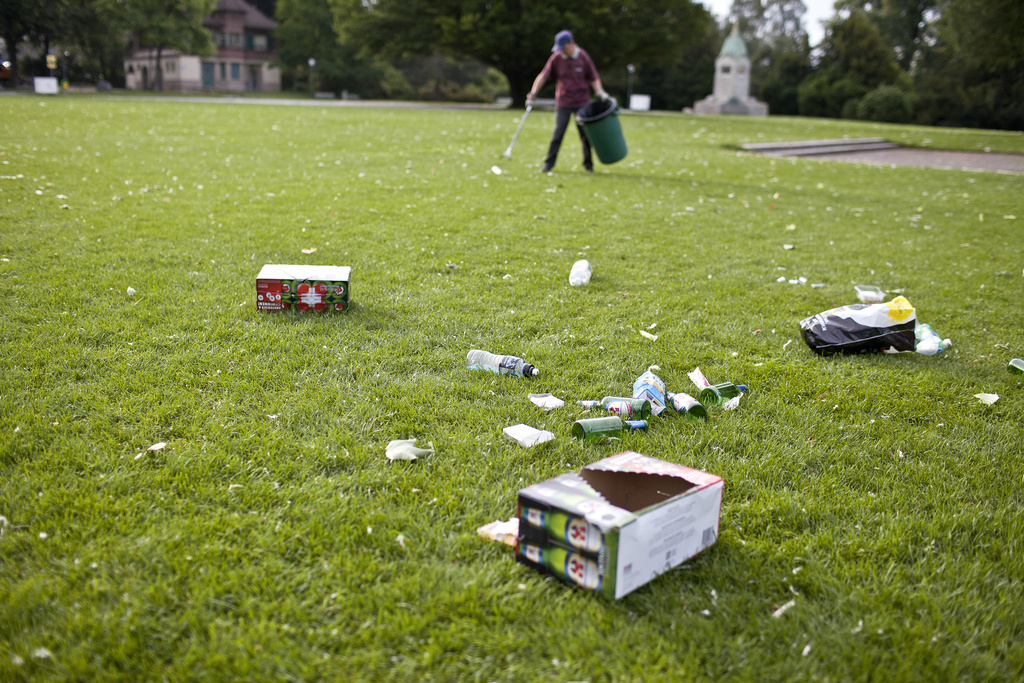
Anti-litter initiatives begin to clean up

The Swiss authorities and environmental organisations are finding new ways to prevent littering - which costs taxpayers up to SFr200 million ($238 million) a year.
Switzerland has the reputation as a green and clean alpine nation. But in fact tons of rubbish are tossed carelessly onto the streets annually.
Littering is not an environmental issue, said Ion Karagounis of the Swiss Foundation for Practical Environmental Protection at a symposium it organised on the issue in Zurich at the end of May.
“But it’s irritating and above all costly,” added Karagounis, who is frustrated that no viable solutions have been put in place to prevent it.
The Federal Environment Office’s findings earlier in May on the cost of littering have reignited the debate.
Although there seems to be no universal approach to reducing littering, there are many different initiatives at the local level in Switzerland to raise awareness of the problem and to encourage the private sector to help come up with answers.
For the last few years anti-littering “ambassadors” from the Interest Group Clean Environment have been patrolling the streets of various Swiss towns.
They ask litterers not to throw their cigarette butts, plastic bags, takeaway containers, bottles and cans onto the ground and try to raise awareness of recycling.
“It’s important to be among the people and to talk to them,” explained one ambassador Cédric Québatte.
No preaching
“We don’t preach to anyone. We simply ask them to use the proper rubbish bin or recycling container,” Québatte said on the sidelines of the Zurich meeting.
People’s reactions are often surprising, even in places considered the most difficult. “I was in Basel one Friday evening at a place where young people often gather to drink alcohol. Some didn’t listen to me, but others reacted positively by picking up empty bottles that they had just left on the street.”
The Interest Group currently has a team of 40 ambassadors, active in about 30 places across the country. But the organisation doesn’t have enough ambassadors to send to all the towns and cities which have requested their services.
As well as dialogue, repressive measures are also sometimes necessary, said Martin Eugster from the environment office of canton Thurgau.
In Swiss-German cantons, anyone caught littering faces a fine between SFr50 and SFr250. About 100 such penalties were handed out by Thurgau’s police force last year.
Takeaway problem
According to a survey conducted in canton Aargau, fines together with awareness campaigns in schools and public places are the most effective.
And businesses, particularly fast food restaurants and takeaways, are expected to do their part. The Federal Environment Office study found that the rubbish left lying on the pavement, in parks and on riverbanks and lakeshores is often fast-food packaging.
Swiss communities spend about SFr70 million francs a year just to clean up the discarded containers, plastic cutlery and serviettes.
While McDonald’s has been employing staff to clean up the immediate mess around its restaurants, not much is being done to reduce the litter left behind by customers of small takeaway businesses. But Bern has now come up with a fresh idea.
It is already mandatory for food and drink stands at public events (festivals, concerts, markets) in the Swiss capital to sell their products in reusable plates, bowls and cups.
Now the pilot project “Takeaway Label” foresees the city’s takeaways introducing a common food container for every type of fast food, from pizza to kebabs. Customers will have to pay a deposit which they will only get back if the container is returned.
“Most of the take away restaurants surveyed said they were interested in the idea,” said Jeannette Morath, who runs the scheme. “Our goal is to see that half of all take away food is sold in these reusable containers.”
But the Swiss Foundation for Practical Environmental Protection believes that any commitment by restaurants, publishers of free newspapers or cigarette manufacturers will not achieve much unless people begin to understand that public spaces belong to all and should be respected.
A study published in early May by the Federal Environment Office found that littering costs taxpayers SFr192 million each year.
Two-thirds of the costs are paid by towns and cities, while a third is covered by public transport companies.
About half of the costs to the communities (SFr73 million) is caused by discarded packaging from takeaway food and drink.
Picking up cigarette butts is also very costly, coming with an annual price tag of SFr59 million.
Most litter takes a long time – often years – before it disintegrates.
Apple core: 3 months
Paper tissue: 3 months
Cigarette with filter: 1-2 years
Chewing gum: 5 years
Stack of newspapers and magazines: more than 10 years
Aluminium cans: 10 to 100 years
Plastic: 100 to 1000 years
Polystyrene: more than 1,000 years
Glass: more than 4,000 years
(source: WWF)
(Adapted from Italian by Dale Bechtel)

In compliance with the JTI standards
More: SWI swissinfo.ch certified by the Journalism Trust Initiative
















![The four-metre-long painting "Sonntag der Bergbauern" [Sunday of the Mountain Farmers, 1923-24/26] had to be removed by a crane from the German Chancellery in Berlin for the exhibition in Bern.](https://www.swissinfo.ch/content/wp-content/uploads/sites/13/2025/12/01_Pressebild_KirchnerxKirchner.jpg?ver=a45b19f3)












You can find an overview of ongoing debates with our journalists here . Please join us!
If you want to start a conversation about a topic raised in this article or want to report factual errors, email us at english@swissinfo.ch.